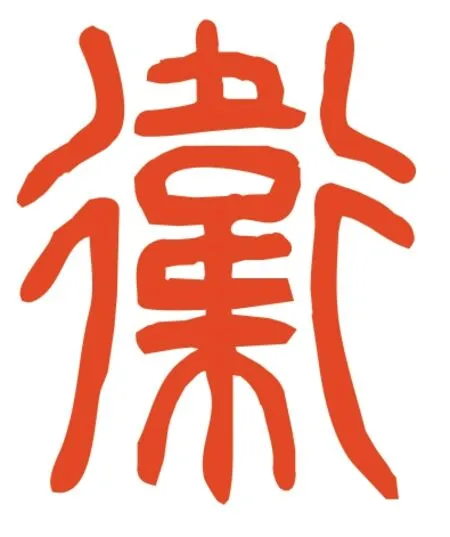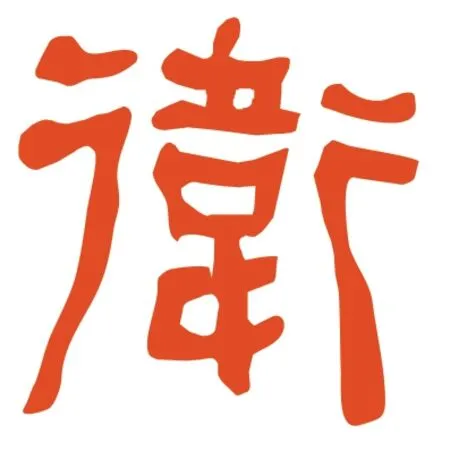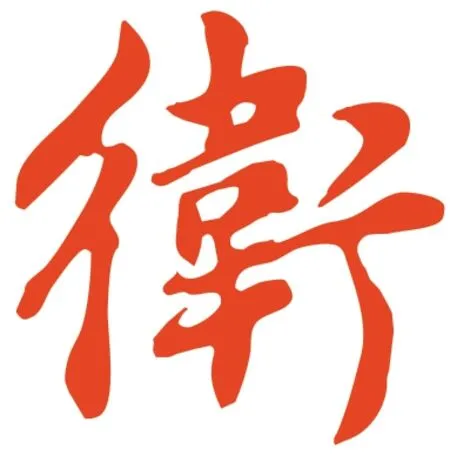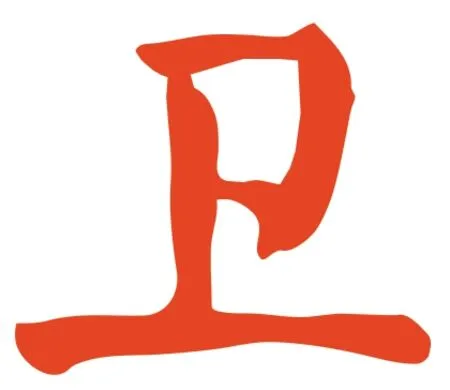卫
2020-06-19
A character that will never let down its guard
卫:千年的守护
“Take up arms, brandish spears/Defend our homes, defend the Yellow River, defend North China, and defend the whole country! (端起了土枪洋枪,挥动着大刀长矛,保卫家乡,保卫黄河, 保卫华北,保卫全中国!)”composer Xian Xinghai’s Yellow River Cantata thunders in its seventh movement, “Protect the Yellow River,” which takes its lyrics from a verse by the patriotic poet Guang Weiran.
Written in 1939 to inspire patriotic resistance in the midst of China’s struggles against Japanese invasion, the renowned chorus drew on the millennia-old metaphor of 保家卫国 (bǎojiā-wèiguó, protecting homes and safeguarding the country), which is still widely regarded as an honorable mission for soldiers as well as ordinary people.
First appearing in oracle bone inscriptions over 3,000 years ago, the character 卫 was originally a pictogram depicting a city flanked by two streets. In its traditional form, the top and bottom portions of the middle radical,, represents two guards patrolling the streets of the city. The simplified form, 卫, is derived from the upper part of the middle radical.
The meaning of 卫 has remained more or less consistent throughout history. China’s oldest dictionary, the Analytical Dictionary of Characters, written in the second century CE,gives the definition of “palace guard.” The Records of the Warring States Period refers to“defending the imperial palace (以卫王宫),”and the Discourses of the States praises Duke Huan of the State of Qi for defeating the“barbarians” and “guarding all administrative states of the Central Plains (以卫诸夏之地).”

SEAL SCRIPT

CLERICAL SCRIPT

CURSIVE SCRIPT

REGULAR SCRIPT
The meanings of “protection” and “defense”persist today in verbs like 守卫 (shǒuwèi, to guard) and 保卫 (bǎowèi, to protect), and nouns like 门卫 (ménwèi, concierge). Celestial bodies which circle the Earth and other planets are called 卫星 (wèixīng, satellites), or人造卫星 (rénzào wèixīng, artificial satellites)for the human-made version, maybe because their orbits make them look like they are guarding the planet. In court cases where the defendant claims to have “retaliated in selfdefense (自卫反击 zìwèi fǎnjī),” the judge must determine whether they reacted reasonably or used excessive force while protecting themselves, or “防卫过当 (fángwèi guòdàng).”
In military history, many engagements are referred to as “保卫战 (bǎowèizhàn, defensive battle).” In 1499, after the Oirat Mongols captured Emperor Yingzong of the Ming dynasty at the Battle of Tumu, and marched toward the Ming capital, official Yu Qian’s victory in the “Beijing Defense Battle (北京保卫战)” saved the Ming court from falling.However, after the Kuomintang army lost the“Nanjing Defense Battle (南京保卫战)” of 1937 to the Japanese, the Nanjing Massacre followed. Most recently, central China’s fight against the Covid-19 outbreak has been compared to a “Hubei Defense War (湖北保卫战).”
The character 卫 is also frequently used in the field of sports. In sports like football,“advance guard (前卫 qiánwèi)” and “full back (后卫 hòuwèi)” refer to those who play offensive and defensive positions on the team,and are derived from older terms describing military positions. A team that wins one year may face the formidable task of “defending the title (卫冕 wèimiǎn)” the following year.To drum up suspense before a match, sports commentators often say: “这届锦标赛的最大看点是上届冠军能否成功卫冕 (Zhè jiè
jǐnbiāosài de zuìdà kàndiǎn shì shàngjiè guànjūn néngfǒu chénggōng wèimiǎn. The biggest draw of this tournament is whether the last champion can defend their title).”
In literature, “to defend the moral principle(卫道 wèidào),” is often used to commend the high morals and ethics of a person. However,it can also be used to criticize blind loyalty and backward thinking. People who defend rigid principles are called “卫道士(wèidàoshì),”usually pejoratively, as in “那些封建卫道士总在感慨今天的女性不如过去贤惠(Nàxiē fēngjiàn wèidàoshì zǒng zài gǎnkǎi jīntiān de nǜxìng bùrú guòqù xiánhuì. Those defenders of feudal thinking always lament that women today are not as virtuous as in the past).”
As people began moving from the farm into crowded cities, hygiene or sanitation (卫生 wèishēng), literally “defend life,” became a matter of public concern. The association of卫 with protecting one’s physical health was put forth 2,000 years ago in the Daoist classic Zhuangzi, which contained “the classics of sanitation (卫生之经),” describing a series of philosophic principles that can better one’s physical as well as spiritual health.
Today, 卫生 appears in many terms related to public health (公共卫生 gōnggòng wèishēng)and sanitation: washrooms are “卫生间(wèishēngjiān),” and toilet paper is “卫生纸(wèishēngzhǐ).” Professionals trained in basic sanitation are called “medical orderlies (卫生员 wèishēngyuán),” and patients living in rural areas without hospitals often rely on the local“sanitation station (卫生站 wèishēngzhàn or 卫生院 wèishēngyuàn).”
卫生 can also be an adjective, meaning clean or hygienic, as in “不洗手就吃东西多不卫生啊!(Bù xǐshǒu jiù chī dōngxi duō bú wèishēng a!It’s so unsanitary to eat without washing your hands first!)” Now, with Covid-19 spreading around China, citizens are urged to adopt all manners of 个人卫生习惯 (gèrén wèishēng xíguàn, personal hygiene habits), including frequently handwashing, mask-wearing, and using serving chopsticks when dining in a group.
In the process, paying attention to one’s sanitation has become a symbol of social responsibility. As an anti-epidemic slogan says:抗击疫情从讲卫生做起 (Kàngjī yìqíng cóng jiǎng wèishēng zuòqǐ. Fighting the epidemic starts from valuing hygiene). Whether it’s in a military battle or war against an invisible virus,all types of defense start close to home.
- HUANG WEIJIA (黄伟嘉), AARON HSUEH (薛凌桥),AND SUN JIAHUI (孙佳慧)
